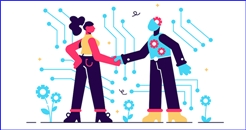 Harnessing AI for social impact
Harnessing AI for social impact
From an article by Impact Entrepreneur
The intersection of artificial intelligence (AI) and social impact presents extraordinary opportunities for positive change. AI-driven solutions are improving efficiency, optimizing resource allocation, fostering the development of innovative products, and facilitating better decision-making.
Its ability to mimic human intelligence and automate tasks holds immense promise for social entrepreneurs seeking scalable solutions. However, the integration of AI into business operations also brings risks and challenges such as job displacement and algorithmic bias concerns, underscoring the importance of responsible implementation and ongoing ethical scrutiny.
Here are four examples:
1. Access Afya - Giving rural communities in Africa access to quality medical expertise at their fingertips.
According to a study by the National Institutes of Health, a growing number of health clinics in Africa are operating below acceptable standards, particularly in low-income neighbourhoods where healthcare infrastructure is limited. Access Afya, which translates to “access health” in Swahili, is keenly aware of this challenge. The healthcare enterprise has undertaken an initiative to integrate ChatGPT into their operating system to enable immediate responses and personal guidance for patients, community health workers, and clinicians seeking medical advice.
To better understand the concerns and expectations regarding the use of AI in healthcare, Access Afya assembled a multidisciplinary team of experts from various fields to thoroughly assess the benefits and risks. They also conducted numerous validation exercises, engaging directly with their target audience - patients, community health workers, and doctors - to create a customized model tailored to their customers’ needs.
2. Husk Power Systems - scaling energy access in rural and peri-urban areas in Africa and India
By employing predictive AI to electrify off-grid communities, Husk’s innovative solutions not only foster economic growth but also aim to serve tens of millions of people and businesses in the world’s most climate-vulnerable regions, especially Sub-Saharan Africa. By automating monitoring and management tasks, Husk is able to use predictive AI to anticipate supply and demand, ensuring electricity is delivered to customers more efficiently and at lower cost.
Husk, which has around 300 mini-grids operating in India and Nigeria, is also using AI-powered solutions to fast-track climate-resilient economic growth with its ground-breaking initiative, Africa Sunshot. Husk aims to establish 2,500 net-zero mini-grids within off-grid and weak-grid communities in Africa over the next five years. Someone Somewhere seamlessly integrates AI-powered design with traditional Mexican craftmanship to create intricate patterns, preserving cultural heritage and empowering local artisans.
3. Someone, Somewhere - working with 300+ artisans in 7 of Mexico’s poorest states to apply traditional handcrafts on clothing and accessories to create quality, on-trend products
Organizations like Someone Somewhere, a social enterprise lifestyle brand in Mexico, are recognizing the importance of balancing technological innovation with social responsibility. Through collaborative AI - integrating AI with human cognition - Someone Somewhere combines its database of artisanal techniques and sustainable materials with AI-powered design tools to show artisans what they can achieve at unprecedented speed. The technology enables social entrepreneurs to enhance efficiency while preserving job opportunities and fostering economic empowerment. The integration of AI into product creation presents a significant opportunity to drive innovation, maintain competitiveness, and deliver superior products into a dynamic market.
4. ONOW - empowering female entrepreneurs in Myanmar
ONOW, an entrepreneurship development system uses AI-driven business training to foster economic empowerment and social inclusion. Their design approaches are women-centric, and as they collect and analyse vast amounts of sensitive information, they are committed to upholding the principles of responsible AI use by prioritizing privacy and ensuring informed consent in their operations. One project is a "High-Flyer Score", which combines personal details from a business owner with externally-curated data. This is then analysed to provide small businesses with a simple, but detailed report on what it means for their unique situation, providing confidence and insight to owners, their coaches, and potential capital providers.
Evolving technologies will continue to reshape the landscape of AI-driven social entrepreneurship and pave the way for greater transparency, accountability, and inclusivity. Through responsible use and interdisciplinary collaboration, there is an opportunity for social entrepreneurs to harness AI’s potential to drive positive change on a global scale.
Read the full article here.
Retweet about this article:
From an article by Impact Entrepreneur, 28/08/2024